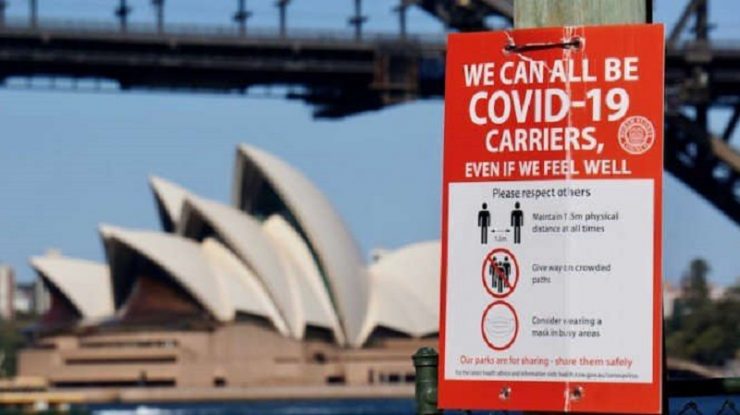THE STATE of New South Wales (NSW) with the capital city of Sydney recorded the highest daily COVID-19 cases with the number of positive cases reaching 804 people as of Monday night (12/13). A total of 21 of these were declared infected with the Omicron variant of the corona virus.
Whereas two weeks ago the number of COVID-19 cases reported was only 179 cases and the last time NSW recorded more than 800 positive cases was on 2 October. Although daily cases are on the rise, the NSW Government will continue to relax the rules.
Starting tomorrow. citizens in NSW who are not vaccinated will get freedom the first time. They can enter public places, such as restaurants, pubs, and shopping centers, which were previously only allowed for people who have been vaccinated by showing proof of a vaccine certificate.
‘Check-in’ with a QR code will only become mandatory at certain places, such as hospitals, fitness centers, pubs, nightclubs, and places of worship. Meanwhile, the use of masks is no longer mandatory in many places.
NSW Head of Government Premier Dominic Perrottet said the emergence of the Omicron variant and the rise in positive cases would have no impact on plans to ease COVID-19 rules.
He encouraged residents to focus on the low number of people who had to be hospitalized, rather than the increasing number of COVID-19 cases.
Since Monday (13/12) the atmosphere of emotion has enveloped the state of Queensland with the capital city Brisbane. For the first time family, relatives and friends are reunited after the state’s borders were opened to citizens of other states.
Australians are allowed to come to the state dubbed the ‘Sunshine State’ provided they meet the requirements. Weeping and tears were seen at Brisbane airport as residents were able to gather and meet again ahead of Christmas celebrations.
Noor Curran, a resident of Sydney, was thrilled to be flying to Brisbane to meet her seven-week-old granddaughter, whom she had never seen before.
“I’ve been waiting for this moment for a long time,” he said, holding his grandson for the first time.
Queensland Tourism Industry Council Executive Director Daniel Gschwind said reopening his state’s borders was “important” for the tourism industry. Queensland’s border closures have cost A$20 billion worth of lost revenue during the pandemic in the past two years. Tens of thousands of small businesses are really hard hit and suffering financially.
He hopes the summer break will change their circumstances, as he estimates the number of arrivals to Queensland will soar by Friday.
Even Tasmania will open its borders to all Australians who have been vaccinated against the two doses starting Wednesday, 15 December, but a number of rules will remain in place, such as applying for permits and conducting tests for people arriving from places listed as high risk.
Persia Brooks, a nursing student in Tasmania, feels she has been cut off from the outside world for two years and the difficult thing is not being able to travel during the pandemic.
“As someone who travels a lot every year for a number of times, then not being able to travel outside makes me think what can be done in the future,” he said, planning to go to Africa.
Meanwhile South Australia will relax rules between Christmas and New Year’s Eve, with a definite date to be announced this Friday.
But the emergence of the Omicron variant meant that some easing could not be carried out as planned in the state with the capital city of Adelaide.
The South Australian government said after 90 per cent of people aged 12 and over had been vaccinated with two doses there would be more easing. Currently, only 84.2 percent of this age group have received full vaccination.
Western Australia, which is still closing its borders to both domestic and international residents during the pandemic, announced it would open them on Saturday, 5 February. But the state with the capital city of Perth is not yet fully back to normal.
International arrivals are only allowed for those who have been vaccinated with two doses and they must also show a negative COVID-19 result, taken at least 72 hours before they fly. Upon arrival in Western Australia, they must be tested for COVID-19 again, a maximum of 48 hours after the day of arrival, and six days later.
Quarantine is not required, except for those who show positive results and who are not vaccinated. The same requirements apply to domestic travelers, but they don’t have to be tested for COVID-19 six days after they arrive. [sources/photo special]
















